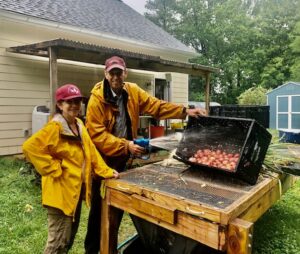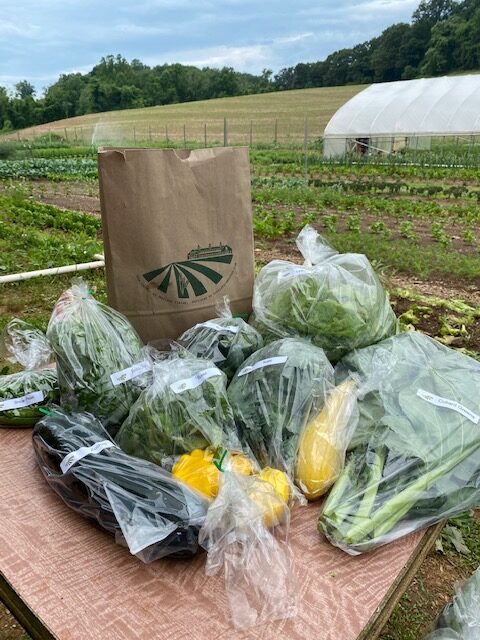by Hannah Goldstein
Rabbi Eugene Lipman was instrumental in founding the Capital Area Food Bank. He helped to work out a deal with local grocery stores to donate canned goods to the food bank but the grocery stores were not able to donate fresh produce. So, Rabbi Lipman solved the problem himself. Rabbi Lipman had a reverence for the land. He spent his free time farming and chopping wood. I’ve heard stories about congregants from that time who were surprised to run into their rabbi in his overalls, covered with mud. As the Capital Area Food Bank got going, Rabbi Lipman was a fixture, often seen delivering baskets of produce that he had farmed himself.
Rabbi Lipman was a visionary and a social justice giant. His muddy footprints beat a path for us to follow in so many ways. One way that we honor his legacy at Temple Sinai is with our annual distribution of Lipman grants. We invite local non-profits to apply for grants to support their work. Honoring that visionary spirit that helped create the Capital Area Food Bank, we seek to support organizations that are just getting started, and prioritize smaller organizations. This year, with the careful oversight of the Davis Center Steering Committee and the approval of the Temple Sinai board, we are making grants to 14 organizations.
The Lipman grant program is not new, in fact, it has been going on for years. Still, I often find that even our most engaged members are surprised when they learn about this part of our social justice work. All of the grant recipients this year are extremely worthy and I urge you to learn more about all of their work. In this post, I want to highlight Community Farm Share, a first time grantee, that so perfectly aligns with the values that shaped Rabbi Lipman’s life.
Community Farm Share connects small, local farms with people who are experiencing food insecurity. Each week, their participants receive fresh, healthy, seasonal produce. They also support local small-scale farmers by paying them a fair wage for the produce that they contribute. Finally, all of their farmers use organic and regenerative farming practices, farming in ways that are sustainable and nourish the earth.
Community Farm Share is a small organization, with just one professional staff member and 15 active volunteers. They applied for a Lipman grant in particular to support a program called “Food is Medicine.” They partner with local clinics to provide weekly fresh produce bags to food insecure patients at the clinics, as well as providing coaching on nutrition and healthy eating. Through this program, their goal is to provide food bags to 100 clients for 25 weeks of the growing season.
At the end of the Book of Leviticus, God outlines the blessings the Israelites will receive if they keep their covenant with God and the curses that await them if they stray. The very first blessing described relates to the harvest. Leviticus 26:3 says, “If you follow My laws and faithfully observe My commandments, I will grant your rains in their season, so that the earth shall yield its produce and the trees shall yield their fruit.” There is great holiness in the blessing of a plentiful harvest. It reminds us of the miraculous workings of the natural world. And, when farmers are called to serve others, a good harvest can provide resources to share with those who are in need. This relationship with the land was a central dimension of Rabbi Lipman’s legacy, and what better way to honor that legacy, than to provide support for local farmers sharing their bounty with those in need particularly during these times of great food insecurity in our country.
To read more about Community Farm Share, click here.

